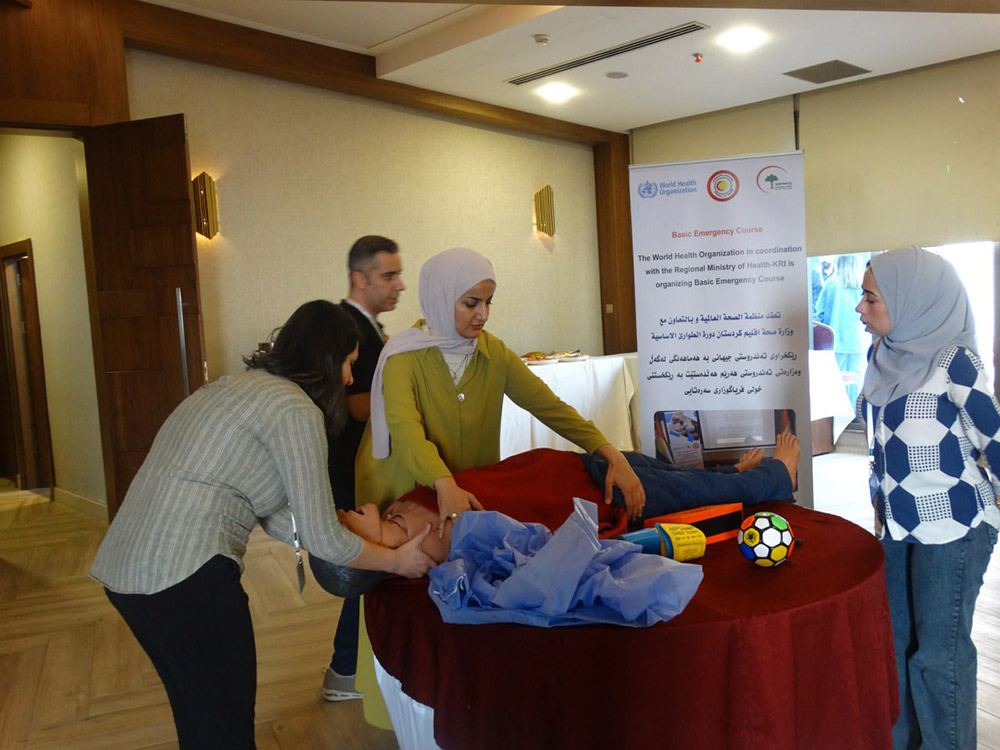 Health workers learn essential life-saving skills during the Basic Emergency Care course delivered at a WHO-supported training workshop. Photo credit: WHO/WHO Iraq
Health workers learn essential life-saving skills during the Basic Emergency Care course delivered at a WHO-supported training workshop. Photo credit: WHO/WHO Iraq
22 January 2024, Baghdad, Iraq – WHO Iraq ended 2023 having boosted the crucial life-saving skills of medical and health staff in emergency units through the rollout of the Basic Emergency Care (BEC) course. This year-long initiative has strengthened the provision of emergency health care across Iraq.
In January 2023, WHO Iraq, working with the Ministry of Health – at the central and Kurdistan regional levels – organized a series of 17 BEC training workshops. These strategically planned trainings were held across Iraq throughout 2023, reaching 277 front-line medical and health workers from various health facilities. Of this total, 42 individuals completed 3 training of trainers workshops and are now registered master trainers.
All workshops drew on an in-depth BEC package jointly developed by WHO and the International Committee of the Red Cross in 2018.
Dr Georges Ki-Zerbo, WHO Representative and Head of Mission in Iraq, expressed his enthusiasm for the initiative’s impact: “The BEC course reflects WHO’s dedication to support the national health authorities to enhance emergency health care capabilities in Iraq. It provides a practical and systematic approach that is crucial for emergency practitioners to effectively manage life-threatening interventions.”
Dr Sally Majeed, a dedicated participant of one of the BEC training workshops, shared the impact of the course: “The BEC course was truly a game-changer for us, the doctors working in the emergency wards. The teaching modules provided a universal approach that we can apply to any emergency situation we encounter in our daily routines. Moreover, the participant workbook has become our go-to reference, offering essential content and key assessment points that greatly assist us in carrying out our life-saving duties at the hospital.”
 Health workers learn essential life-saving skills during the Basic Emergency Care course delivered at a WHO-supported training workshop. Photo credit: WHO/WHO IraqThe BEC package, which includes a participant workbook, acts as a comprehensive guide that covers essential skills, a glossary of terms, review questions, case scenarios and a simulation. It also includes quick reference cards that offer ongoing support to participants in clinical settings beyond the workshop. The package is also designed to assist various stakeholders, such as governments, educational institutions and professional societies, in training emergency care providers within their designated scope of work.
Health workers learn essential life-saving skills during the Basic Emergency Care course delivered at a WHO-supported training workshop. Photo credit: WHO/WHO IraqThe BEC package, which includes a participant workbook, acts as a comprehensive guide that covers essential skills, a glossary of terms, review questions, case scenarios and a simulation. It also includes quick reference cards that offer ongoing support to participants in clinical settings beyond the workshop. The package is also designed to assist various stakeholders, such as governments, educational institutions and professional societies, in training emergency care providers within their designated scope of work.
The 4-day programme for the BEC training workshop covered a diverse range of acute and potentially life-threatening issues such as trauma, breathing difficulties, shock, altered mental status, chest discomfort, poisoning and severe pain.
“The success of this comprehensive training initiative highlights WHO Iraq’s commitment to contribute to advance emergency health care and create a lasting impact on the country’s health care landscape,” said Dr Ki-Zerbo, emphasizing the importance of the course for Iraq’s emergency professionals.
This impactful initiative would not have been possible without the support of the WHO Regional Office for the Eastern Mediterranean and key partners and donors such as the U.S. Department of State’s Bureau of Population, Refugees, and Migration.
For more information, contact:
Ajyal Sultany
Communications Officer, WHO Iraq
Email:
Mobile: +9 64 77 40 89 28 78


